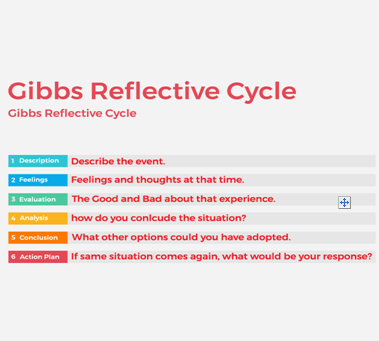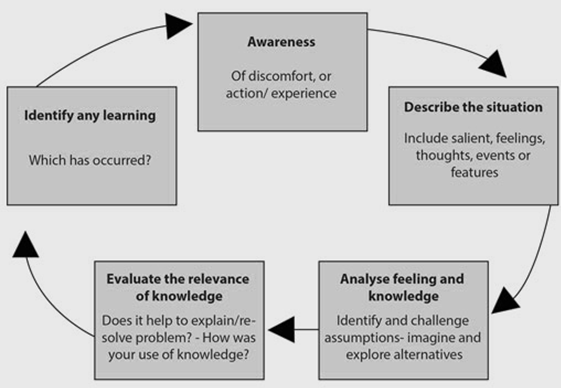Table of Contents
Introduction to reflective essay
A reflective essay is best described as an essay that reflects on personal experience and the learning process of a person. Reflection essays are the account of a particular event, learning experience, impact on the writer, and the right guidance for people who read it.
An Example of a reflective essay could be the travel diary of a person. In which he/she wrote all the experiences, situations, challenges, lessons, and the impact on the personality (good or bad).
In this article, I will tell you everything about how to write a good reflective essay? How to select a Reflective essay topic? How to start a reflective essay? Format of reflection essay, Structure of the reflective essay, and the trick to critically analyze the topic before writing.
The format of reflective essay:
The term “Reflective” means examining personal life experiences and the reflective essay is comprised of those experiences in the written form. The purpose of a reflective essay is to provide an opportunity for the writer to reflect on his/her particular life experiences, what he/she learned? And how they changed after surviving that particular event?
There are several formats of reflective essay are available to follow, but you will mostly find them in learning log format or diary. Diary writing is a special way of writing down daily personal life experiences, what the issues did the writer face, and how she/he has developed and with due time.
The format of the reflective essay can be changed according to the purpose of the writing and the target audience. Reflective essay writing can be done for magazines, academic writing, travel blog, or any event. People use reflective essays to inspire other people and make them think deeply and critically about a learning experience. There are 2 common formats of reflection essay, For example:
Essay on Personal growth:
It can also be called a personal reflective essay. It helps the reader to analyze their personal experiences and help them develop emotional relation. Through this way, readers can understand themselves and their behavior.
Reflective Essay literature:
The literature essay requires a summary of the literature, and it is applied to the personal life afterward.
There are hundreds of example of a reflective essay are present on the internet to study and learn.
How to write reflective essays
In this section, I shall tell you the process of step-by-step reflective essay writing. The first step is to think about it thoroughly in detail. Then, Write down everything. Describe it fully and clearly, utilize all 5 senses when you analyze a particular situation.
Another Pro tip I want to give you is, always be sure to use the most appropriate adjectives to describe your experiences in the best way. Write down everything in short phrases and sentences, the experiences, responses, perceptions related to that particular event.
After writing down everything on the paper, you start reflecting on it. The perfect way to do this is to start by asking questions about your own experiences. That allows you to think even deeper and critically analyze the thoughts and perceptions even better. I have gathered some sample questions to guide you in a better way.
Questions:
Q1: What did you learn about yourself as a result of that experience?
Q2: How have you developed?
Q3: What was the impact? Positive or Negative
Q4: did you do anything differently? If Yes, then what was it?
Q5: what choices did you make? And why?
Q6: What skills did you learn in return?
These questions can help you kick-start your reflective essay. This will help you think critically and in more detail. This skill is the heart of writing reflective essays.
The Structure of Reflective Essay:
A common mistake people make when writing a reflective essay is that they avoid the planning phase. This first step is to learn how to start a reflective essay.
People always commit this same mistake again and again. People do not focus on the structure of the reflective essay and start without any sort of planning. This mistake can cause serious damage to the structure, coherence, and the core subject of the reflective essay which is the “experience sharing.”
There is a simple and easy way to create a reflective essay outline that comprises only three steps. The three major sections or parts of the essay are:
-
Introduction
Introduction is the most important part of every essay. The reflective essay introduction consists of two main things, the “Hook” and the “Thesis Statement”. The Hook is used to grab the interest of the reader in the beginning, and the thesis statement to tell the readers why you are writing this reflective essay.
The beginning the most crucial part of any essay as you can capture the reader’s attention and keep it till the end or you don’t. Therefore, you need to take extra care of the introduction part of the essay.
-
Body
This is where you tell the story. The body of the reflective essay body is like a container that holds the entire matter of the essay. The experience, the challenges, the lessons, and the guidance for the readers.
In the body of the essay try and adopt the chronological method to describe the events. Adopting this approach is not an obligation but, by using it you can sort every event as it happened in a timeline. You do not have to write the reflective essay linearly but through this way, you can prevent the topics from merging in one another creating a confusing puzzle.
Be sure to include three things in the body when writing reflective essay:
- Critique and Reflection
- The impact and Experience
- The lessons you learned
Avoid writing a summary instead of reflecting on the past in the form of a response. Which leads to particular development in your character.
-
Conclusion
People might ask a question like does a reflection paper need a conclusion? The concluding paragraph or the conclusion is necessary and it is the summary of the entire reflective essay. You can discuss the situation and the lesson you learned in the conclusion.
However, you can add some points on how your attitude and behavior changed? What skills did you acquire? How did you develop your character? Approach to specific situation, and what action would you take in response to the same situation in the future? How did you consolidate your learning experience? It might seem complicated in the beginning but with practice, it will eventually become easy.
What Are The Benefits Of Reflective Essay Outline?
- The essay outline helps you organize all the elements in a perfect position while writing. It helps to maintain the hierarchy of the topics and the coherence in the essay.
- The outline is the map of the essay. You prepare it in advance and then you go through that plan step by step to create your essay. It also shows the thought clearance and the organizational skill of the writer.
- Think of the outline as the “Skeleton” of the essay. First, you develop the skeleton and then start putting skin on it.
Models of Reflection:
Reflective writing models are the frameworks for writing the reflection in an essay. The reflection model is used as a structured process for personal & situational analysis, and the resulting improvement. Although, there are many models of reflective essays, but in this article, we shall discuss two models of reflection briefly.
Gibbs model of reflection:
Gibbs reflective model or also known as Gibbs reflective theory is a six-step process to explore a certain situation. Gibbs in 1988 presented this theory of reflection. A question may arise in the mind, why use Gibbs reflective cycle? – The answer to this question is simple. The Gibbs reflective cycle helps to get a deeper insight, and detailed analysis.
The steps of Gibbs reflection are illustrated below:

Atkins & Murphy Reflection Model
Atkins & Murphy Reflection model was developed in 1993. It deals with the previous experiences and helps to identify weak points and helps to improve further. This model states that discomforts are necessary for improvements. This model requires a positive attitude towards bad past experiences to find out weaknesses and provide guidance for the future. The process of Atkins & Murphy is illustrated below:

Why Write a Reflective Essay?
I shall now conclude this article by answering this simple question1 “Why Write a reflective Essay?”
There are Important moments in life when you had to make a decision. Reflect on how you took that decision? What were the outcomes of that decision? What did you learn in return? And, what decision-making process do you follow afterward?
It can be written by getting reflective essay ideas from reading a sample reflective essay somewhere. Or you can share your personal experience to guide people on how did you solve a particular problem or what was your decision at the problematic time.
The aftermath of that decision is really important. You have to tell the experience, what you learned? Without this, it is just storytelling.

